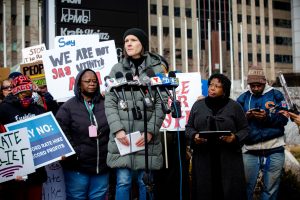 The Illinois Commerce Commission (ICC) has ordered a $15.4 million refund for Peoples Gas customers and most recently a refund of more than $31 million for Nicor Gas customers, two votes that may signal a tougher stance towards utilities whose rampant spending has helped spark a heating-affordability crisis in Illinois.
The Illinois Commerce Commission (ICC) has ordered a $15.4 million refund for Peoples Gas customers and most recently a refund of more than $31 million for Nicor Gas customers, two votes that may signal a tougher stance towards utilities whose rampant spending has helped spark a heating-affordability crisis in Illinois.
Of course, the utilities have vowed to fight the decisions in court.
The Peoples Gas refund, ordered on May 18, was connected to a decision by the utility in 2017 to halt disconnections while installing a new billing system. The ICC ruled that the move led to an excessive rise in bad-debt costs. If a utility can’t collect past-due debt from customers, state law allows them to eventually pass those long-term “uncollectibles” costs onto all customers in the form of a surcharge. But the ICC reviews these costs to make sure the utilities did everything possible to keep that debt under control.
In this case, the ICC voted unanimously that Peoples Gas had to refund $15.4 million of the uncollectibles recovery costs it had gotten from customers in 2018. The vote in favor of the refund actually went against the recommendation of the ICC staff and an ICC administrative law judge. The amount is set to be refunded over nine months beginning in September, but the issue could end up before the Illinois Appeals Court.
In the Nicor case, the ICC ruled in June that the utility improperly charged customers $31 million in infrastructure spending in 2019. The money was collected through the controversial Qualified Infrastructure Plant (QIP) surcharge on gas bills, and the ICC ruling marked the first time regulators determined Nicor may have misspent money collected through the QIP. The surcharge, which was created by state law in 2013, will sunset at the end of this year, and consumer advocates have opposed it for years, arguing it has sparked rapidly rising gas bills. Under the law, the ICC reviews how utilities spend these surcharges that are meant to cover the cost of system upgrades, plus a profit, but can disallow spending it deems inappropriate.
The Nicor vote was the latest action that may signal new commissioners recently appointed by Gov. J.B. Pritzker are ready to take a tougher, pro-consumer stance when dealing with utilities. Another example came as part of Peoples Gas’ record $402 million rate-hike request: The ICC pushed the utility to answer more questions about its troubled pipeline-replacement program. (In a recent news release with Illinois PIRG, CUB criticized the company for not answering the ICC’s questions.)
Reporting on the ICC refund vote, Crain’s Chicago Business wrote that “the surprisingly harsh ruling signals that commissioners are losing patience with Peoples. Chicagoans’ heating bills have been rising relentlessly for years, in large part due to the costs of Peoples’ multibillion-dollar (pipeline-replacement) program to update all of Chicago’s gas pipes. More than one-fifth of residential customers are over 30 days behind on their gas bills, according to Peoples’ filings with the ICC.”
In March, Gov. J.B. Pritzker announced three new members of the ICC: Chairman Doug Scott, Conrad Reddick and Stacey Paradis.
Scott, a former legislator and Mayor of Rockford, has already served as ICC chair once before. He was selected by Gov. Pat Quinn to that post from 2011 to 2015. During that time, ComEd didn’t like the way Scott interpreted the 2011 formula rate law. The utility giant actually got legislation passed that adjusted the formula rate to make it even more favorable to ComEd and also changed ICC decisions to give the utility bigger rate hikes.
Reddick is a former energy attorney with the City of Chicago who has worked with CUB in the past to fight rate hikes. Paradis is the former executive director of the Midwest Energy Efficiency Alliance.
Reddick and Paradis were already on the commission for the Peoples Gas and Nicor rulings. Scott took the helm on June 20, as the ICC considers more than $2.7 billion in rate-hike requests from gas and electric utilities.
“Illinois is in the midst of a major energy transition, and thanks to the Climate and Equitable Jobs Act, the Commission has a major role to play in helping the state responsibly and affordably turn its clean energy goals into a reality,” Chairman Scott said in a news release.

